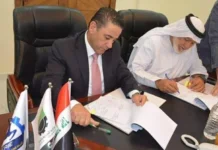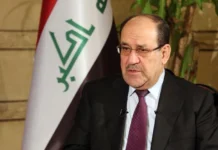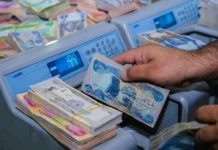Tishwash: The International Development Bank sponsors the Faw Port Summit.
The International Development Bank announced its strategic sponsorship of the Faw Port Summit, stressing that this participation aligns with its vision to support Iraq’s efforts to transform into a leading regional logistics and trade hub.
The bank explained in a statement received by the Iraqi News Agency (INA), that “its active presence on the regional and international scene is consolidated by the opening of its branch in the United Arab Emirates, in addition to the Umm Qasr Port branch, as well as its network of branches spread across all Iraqi governorates, which reflects its commitment to providing innovative banking solutions that contribute to enabling investment in strategic infrastructure projects and achieving sustainable economic returns.”
The bank affirmed that “its sponsorship of this important international event represents a practical step towards consolidating its role as a trusted financial partner, putting its banking expertise at the service of major national projects, most notably the Grand Faw Port Project, which represents a fundamental pillar in the future of the Iraqi economy.” link
Tishwash: The Prime Minister chairs a meeting to follow up on mechanisms to support banks in implementing infrastructure and development projects.
Prime Minister Mohammed Shia al-Sudani chaired a meeting on Wednesday to follow up on mechanisms to support banks in implementing infrastructure and development projects.
The Prime Minister’s media office said in a statement received by the Iraqi News Agency (INA): “Prime Minister Mohammed Shia al-Sudani chaired a meeting today, Wednesday, dedicated to discussing and following up on mechanisms for investing banking facilities in supporting the completion of infrastructure projects and development projects being implemented throughout Iraq.”
He added, “During the meeting, the progress made in reforming the banking system was discussed, making it one of the tools for supporting development and expanding banking activities within the context and controls of globally recognized banking practices.”
He added, “The meeting discussed optimal investment of Iraqi assets through banking facilities for strategic investment projects and basic infrastructure projects, particularly those related to energy, such as oil, gas, and electricity projects.” link
************
Tishwash: Al-Sudani on the oil agreement with Erbil: An achievement that represents an important milestone for Iraq
Prime Minister Mohammed Shia al-Sudani considered the oil agreement between Baghdad and Erbil on Wednesday an achievement that represents an important milestone for Iraq and all Iraqis.
His office stated in a statement it received:IQ), that “the Sudanese met, today, Wednesday, with representatives of the company HKN American Energy welcomed the investment partnership of the company HKN In Iraq, he considered it a positive indicator that reflects growing confidence in the country’s investment environment.
Al-Sudani pointed out that “this step comes as an extension of agreements recently concluded with American companies in various sectors, which contributes to strengthening bilateral economic relations between Iraq and the United States.”
He expressed his “appreciation for the role of the company.” HKN In completing the recent agreement to export oil from the Kurdistan Region of Iraq, and facilitating the reopening of the Iraq-Turkey pipeline, as an important station in developing the energy sector, enhancing sovereignty and fair management of wealth, ensuring that the Iraqi people benefit from their national resources,” stressing that “this achievement represents an important milestone for Iraq and for all Iraqis.” link
************
Tishwash: Al-Sudani and Barzani agree on a US-sponsored financial deal. Iraq is losing its wealth to Erbil.
Recent amendments to the Iraqi budget have sparked widespread controversy over the granting of illegitimate financial privileges to the Kurdistan Region, amid accusations by MPs and government opponents of foreign influence over the country’s financial policies.
Amid ongoing disputes between the federal government and the Kurdistan Region over the distribution of financial resources, the budget amendment has intensified criticism, with Kurdish officials accused of exploiting public funds for personal political gain.
Political deal or constitutional amendment?
Independent MP Yasser al-Husseini criticized the passage of the budget amendment, describing it as “serving foreign agendas at the expense of national autonomy.” He added that the Kurdistan Democratic Party (KDP) tends to prioritize its partisan and personal interests over the fair distribution of funds among citizens in the region.
Al-Husseini told Al-Maalouma, “Talk about autonomy and adherence to the constitution is unrealistic in light of the weakness of state institutions and the efforts of some parties to please the US at the expense of the interests of the Iraqi people.”
He stressed that “the continuation of these policies confirms that some forces continue to prioritize foreign interests over national autonomy, which requires a firm national stance to preserve Iraq’s wealth and prevent its exploitation to serve non-Iraqi agendas.”
Financial Flexibility Raises Concerns
In turn, economic researcher Abdul Salam Hassan Hussein pointed out that the budget was designed with great flexibility, allowing the region to dispose of oil revenues without clear restrictions. This opens the way for the funds to be used to pay off debts rather than develop the local economy.
Hussein added to Al-Maalouma, “The constitutional laws are clear, but political pressures allow for circumventing difficult provisions and passing decisions without strict adherence to the constitution.”
Persistence of Old Crises
Observers point out that the financial relationship between Baghdad and Erbil suffers from a lack of oversight and transparency. The region has continued to manage the oil fields and deduct funds for more than two decades without any real change, which increases fears of a recurrence of political deals that ignore the interests of the Iraqi people. link






